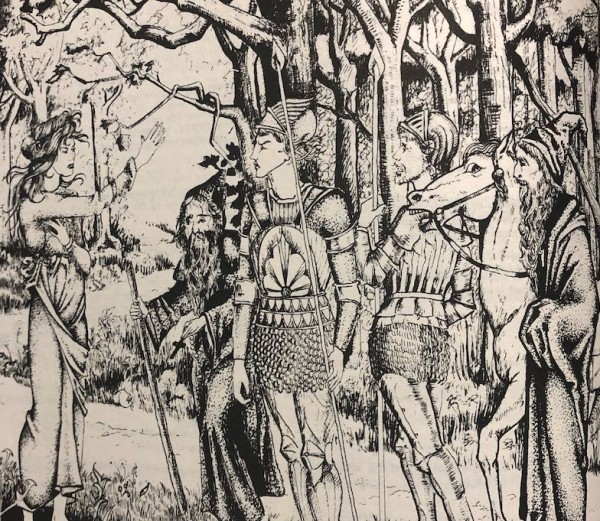Reaction Rolls Aren’t All About You
2022-11-27

Adventure.
Reaction rolls are a key part of AD&D gameplay and I ask players to make them
regularly. Players in our campaign typically don't bother parlaying with
mean-looking creatures in dungeons (for better or worse), though the reaction
roll gets used frequently otherwise.
I apply the reaction roll in all these cases, and more:
- Initiating communication with monsters or NPCs during an expedition. (The use
of "monsters" here being applied generally, to any non-classed entity the PCs
are capable of communicating with in a meaningful way.)
- Being the party "face" during an interaction with an NPC, especially the first
interaction with that NPC. I will often call for subsequent reaction rolls
from the same NPC when the PCs are asking for something (including
forgiveness).
- Haggling for a better payment when selling a magic item. A poor reaction means
the offer gets worse.
- Haggling for lower prices when buying. A poor reaction means the prices go up.
- Convincing hirelings to take on dangerous jobs, or to take a job for less
money. Especially in the case of the hazardous duty mentioned on DMG 34.
- When visiting a hiring hall for mercenaries, to determine how many rolls (if
any) the party gets on the mercenaries table on DMG 30.
- Requesting a favor during speak with animals (normally the caster can only
ask questions, see PHB 46).
This is a fast, clean, versatile mechanic, and it can produce some extremely fun
and interesting results. It can score the PCs a major unexpected win, or
conversely create an unexpected challenge! And importantly, it's a fair,
impartial game mechanic and a fun roll of the dice.
This is a roll that players can make for themselves, and indeed I have yet to
roll one myself in our campaign. But it's important for everyone to understand
that though a player may be making the roll, the result is only partially
about their character.
There is a huge, 1-to-100 random value being added in by the percentile dice. My
interpretation is that this portion of the roll only partially represents the
performance of the character. There are two portions of a reaction roll result:
- The PC's performance in the interaction, which is represented by (1)
their reaction modifier from charisma, (2) reaction modifier from other
sources, and (3) a portion of the d100 roll.
- Circumstances outside the PC's control –- the other portion of the d100
roll. This includes the other party's natural disposition, personality, how
they're feeling today, whether the weather has had an effect on their mood,
how they feel about life, whether they just had an argument with a friend
today, if they're sick, if they have a headache, and an infinite number of
other possibilities. In AD&D fashion, all this is abstracted into a flick of
the wrist, a toss of the dice.
Just like morale rolls, pursuit rolls, and sage rolls, there are a huge number
of in-world conditions that can affect a reaction check. That's why percentile
dice are used to produce a wide range here. Whether you call it luck, life, or
"the intricacies of the universe," reaction rolls aren't all about the checking
character.
← Go back home

